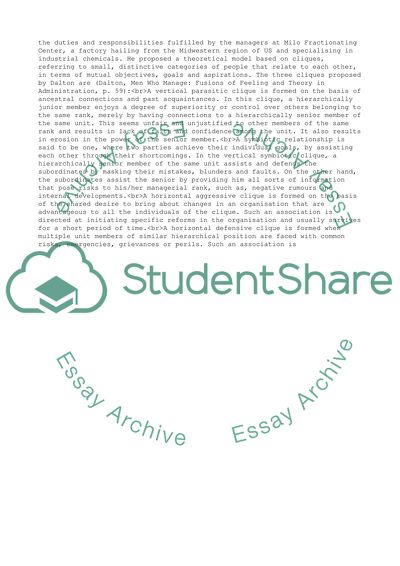Cite this document
(Evaluation of Managerial Works Essay Example | Topics and Well Written Essays - 2250 words - 2, n.d.)
Evaluation of Managerial Works Essay Example | Topics and Well Written Essays - 2250 words - 2. https://studentshare.org/management/1805932-management-work-has-been-researched-through-a-large-number-of-studies-using-a-wide-range-of-methods-over-the-last-four-to-five-decades-what-are-the-most-important-findings-in-your-view-and-why-drawing-upon-the-readings-for-module-bus118-on-management-st
Evaluation of Managerial Works Essay Example | Topics and Well Written Essays - 2250 words - 2. https://studentshare.org/management/1805932-management-work-has-been-researched-through-a-large-number-of-studies-using-a-wide-range-of-methods-over-the-last-four-to-five-decades-what-are-the-most-important-findings-in-your-view-and-why-drawing-upon-the-readings-for-module-bus118-on-management-st
(Evaluation of Managerial Works Essay Example | Topics and Well Written Essays - 2250 Words - 2)
Evaluation of Managerial Works Essay Example | Topics and Well Written Essays - 2250 Words - 2. https://studentshare.org/management/1805932-management-work-has-been-researched-through-a-large-number-of-studies-using-a-wide-range-of-methods-over-the-last-four-to-five-decades-what-are-the-most-important-findings-in-your-view-and-why-drawing-upon-the-readings-for-module-bus118-on-management-st.
Evaluation of Managerial Works Essay Example | Topics and Well Written Essays - 2250 Words - 2. https://studentshare.org/management/1805932-management-work-has-been-researched-through-a-large-number-of-studies-using-a-wide-range-of-methods-over-the-last-four-to-five-decades-what-are-the-most-important-findings-in-your-view-and-why-drawing-upon-the-readings-for-module-bus118-on-management-st.
“Evaluation of Managerial Works Essay Example | Topics and Well Written Essays - 2250 Words - 2”. https://studentshare.org/management/1805932-management-work-has-been-researched-through-a-large-number-of-studies-using-a-wide-range-of-methods-over-the-last-four-to-five-decades-what-are-the-most-important-findings-in-your-view-and-why-drawing-upon-the-readings-for-module-bus118-on-management-st.


